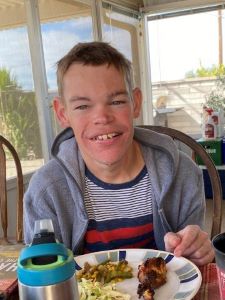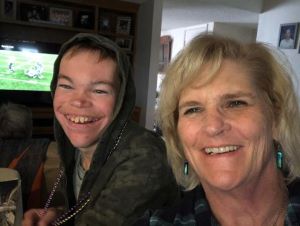At 34, Conner has been seizure-free for five years – an incredible milestone for a man who, at the age of 8, was living on the floor in a daze brought on by hundreds of daily seizures and five epilepsy medications.
In the intervening years, Conner has been blessed with people who care: a physician and dietitian in Tucson who helped navigate his early efforts to the life-changing ketogenic diet; his most recent care team at Phoenix Children’s who identified his underlying genetic issue and safely weaned him off the keto diet for long-term health; and his mother, Kathy, who has guided him through three decades of complex neurological and developmental issues, advocating for him at every turn.

Conner’s Story
Until he was 16 months old, Conner was like most toddlers – in constant motion, engaging with and discovering his world. Then one day while crawling, he dropped like a ragdoll to the floor, motionless. Several seconds later, he got back on his knees and continued crawling as if nothing had happened, recalled his mother Kathy.
This was the first of many such “drop seizures” for Conner, who was ultimately diagnosed at age 3 with Lennox-Gastaut Syndrome, a severe and uncommon form of epilepsy. Resistant to many medications, Lennox-Gastaut can lead to brain damage and developmental delays. This became true in Conner’s case.
“For much of his early life, Conner spent most of his time on the floor because he was either seizing or completely dragged out by the five different medications he was taking,” said Kathy. “It was so difficult.”
With no options in sight for her 8-year-old son, Kathy happened to see the movie “First Do No Harm,” which features the positive effects of the ketogenic diet for some people with epilepsy. The next day, she asked Conner’s neurologist and dietitian to help her try this new path. They agreed.
After extensive research, they admitted Conner to a hospital in Tucson for a 24-hour fasting period designed to force Conner’s body to produce ketones. In this state of “ketosis,” the body burns fat for fuel rather than carbohydrates. Ketosis also decreases inflammation in the body and increases a neurotransmitter called GABA, which has a calming effect on the brain, possibly helping explain how it can control seizures in some patients. Conner experienced immediate effects.
“Within 24 hours, it was like a light bulb went off,” said Kathy. “He was a new kid. He was babbling, trying to make the sounds he had been hearing all his life. He was making eye contact for the first time since he was a toddler. It was amazing.”
The next year, however, was a rollercoaster of medication adjustments and highly precise calorie counting and carbohydrate management. Even Conner’s toothpaste had to be sugar-free. Fortunately, his seizures became less and less frequent. Despite his significant developmental disabilities and the fact that he is nonverbal, Conner began to engage more with his family in his own ways.
Kathy was relieved that Conner was no longer experiencing as many seizures, but she also knew that a long-term keto diet had its drawbacks. The strict limitations of the diet had left Conner small and very thin. At 5’ 4”, he weighed just 104 pounds. Additionally, Conner had begun to live in a group home, making it more difficult to control what he ate. Consequently, the seizure risk was ever-present.
Transitioning Safely from Keto, with Help from Phoenix Children’s
These concerns led Kathy to do new research, and she found Phoenix Children’s, which at the time, offered the state’s only Ketogenic Diet Therapy Program in conjunction with the Barrow Neurological Institute. Although Conner was 30 at the time and no longer considered a child chronologically, Phoenix Children’s team agreed to meet him. Given his small size and developmental level, both Randa Jarrar, MD, one of the program’s epileptologists, and Christi Wheeler, MS, RDN, CSP, the ketogenic dietitian, felt they were well positioned to assess and treat Conner.
First, they evaluated his overall metabolic health. “Second, we needed genetic testing,” said Dr. Jarrar, who viewed this as a very important next step. “Lennox-Gastaut Syndrome is a broad label with many underlying causes. To develop the best possible treatment plan, we needed to understand the underlying genetics.”
Therefore, they conducted a genetic test – one that had been conducted on Conner several years earlier when genetics was in its infancy (and did not reveal any abnormalities). However, this time, Conner’s issue was identified: a GABRG2 mutation.

“This is a rare variant, but it gave us insights into Conner’s health,” said Dr. Jarrar. “We tested the family as well, and they did not have this variant, so Conner’s genetic mutation was random. Knowing the specific mutation, however, guided our medication choices, gave the family closure and provided an opportunity for them to connect with others with the same diagnosis through online support groups.”
Armed with his health assessment and genetic testing results, Christi Wheeler set out to improve Conner’s overall nutrition. She wanted to ensure Conner’s long-term health, help him gain weight, introduce him to new food options – all while remaining seizure free.
“Weaning the ketogenic diet generally takes five to 12 weeks, but in this case it took 12 months,” said Christi. “We modified his diet slowly as we also were making adjustments to his medications and supplements based on his ongoing lab work. It took time, but we ultimately found the right balance for Conner to thrive even off ketogenic therapy.”
“Christi opened up a whole new world for us,” said Kathy. “It was wonderful to see Conner try and enjoy new foods. He was very receptive. He loved spaghetti squash, for example. He began to put on weight, and we felt more comfortable that he could be managed at the group home without the rigidity of the keto structure.”
Christi said the keto diet is extremely valuable for some patients, including those with certain types of intractable epilepsy, Alzheimer’s, Parkinson’s and even some types of cancer. “But the patient must be carefully managed and monitored. We are so glad we were able to help Conner come off keto safely and that he is doing so well.”
“I can’t say enough about Dr. Jarrar and Christi,” said Kathy. “They were wonderful with Conner. The genetic test results opened my eyes. I’ve joined a Facebook group of parents, and it’s been very interesting. And Conner has a life now. All parents need hope, and Dr. Jarrar and Christi have certainly given us that and much more.”
To learn more about Phoenix Children’s Ketogenic Diet Therapy Program, click here.
